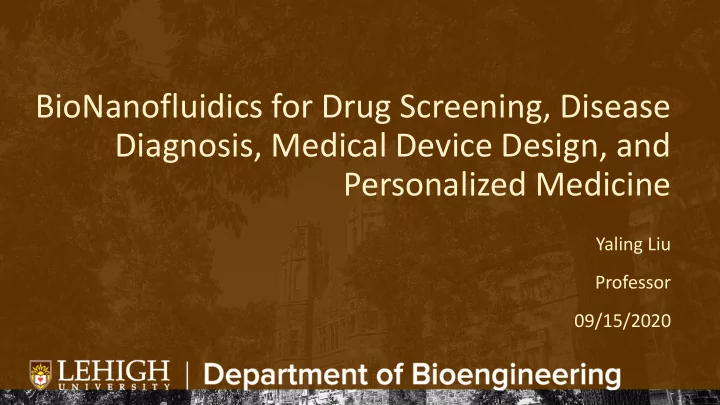

BioNanofluidics for Drug Screening, Disease Diagnosis, Medical Device Design, and Personalized Medicine Yaling Liu Professor 09/15/2020
Brief Bio of Yaling Liu • ASME Fellow, Associate editor of Journal of Medical Device • Education Northwestern University, Department of Mechanical Engineering, PhD 2006 • key publications 1. S. Wang, Y. Zhou, X. Qin, S. Nair, X. Huang, Y. Liu, “Label Free Detection of Rare Circulating Tumor Cells by Image Analysis and Machine Learning”, Scientific Report, in press, 2020 2. M. Razizadeh, M. Nikfar, R. Paul, Y. Liu, “Coarse-Grained Modeling of Pore Formation, Growth, and Reseal on the Red Blood Cell Membrane Under Large Dynamic Deformations”, Biophysical Journal, 119 (3): 471-482, 2020 3. C. Uhl, W. Shi, Y. Liu, “Microfluidic Device for Expedited Tumor Growth Towards Drug Evaluation” Lab on a Chip, 19, 1458-1470, 2019 4. W. Shi, S. Wang, A. Maarouf, R. He, Y. Doruk, Y. Liu, "Magnetic Particles Assisted Capture and Release of Rare Tumor Cells using Wavy-herringbone Structured Microfluidic Devices", Lab on a Chip, 17, 3291-3299, 2017 • Keywords for research Biotransport, Microfluidics, Nanomedicine, Cell Mechanics, MEMS, NEMS
Biomimetic Drug Evaluation Platform Nanoparticle binding on biomimetic blood vessel We developed cell-seeded microfluidic chips for endothelium coated to mimic blood vessel evaluation of various nanoparticles drug carriers Binding distribution of ICAM-1 coated 210nm fluorescence Real-time particle binding Vascular Permeability nanoparticle on anti-ICAM-1 coated microfluidic channels study under flow dynamics
Cancer Diagnosis and Personalized Medicine A CTC from MM-05 In collaboration with Lehigh Valley A WBC from MM-05 Hospital, we are using liquid biopsy A CTC from (circulating tumor RCC-06 cell and circulating Lab on Chip Capture of Circulating Tumor Cell from Patient Blood Sample tumor DNA) for cancer diagnosis, monitoring, and personalized drug screening 3D culturing of tumor spheroid for personalized drug testing
Hemolysis Prediction in Medical Devices Multiscale modeling of blood cell damage in medical device Hemolysis evaluation is an important step for FDA approval of any blood-wetting device. In collaboration with University of Maryland Medical School, we aim to develop a cellular model that can predict hemolysis in any device.
Contact Looking for PhD student and Post Doc Our research is supported by National Institute of Health (NIH) National Science Foundation (NSF) Contact: yal310@lehigh.edu
Recommend
More recommend